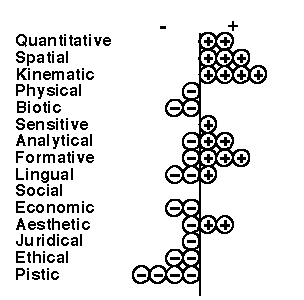
What is Good? What is Success, Prosperity, Health, Wellbeing, etc? What is Evil, Failure, Destitution, Dysfunction, Malady, etc.? Does it relate only to the individual, or can (should) it relate also to others, and even to the whole of Creation? Does it relate to Sustainability? What about the high failure rate of information system? Can we promote justice in our business dealings and survive? (that is, can we simultaneously realize the norms of the juridical and economic aspects?) These are questions that what we call the Shalom Principle tries to address.
Each aspect can bring good. Imagine life characterized by the following:
| Aspect | Good and blessing |
|---|---|
| Biotic | Health |
| Sensitive | Mental and sensory health and alertness |
| Analytical | Clear thinking |
| Formative | Creativity, good planning and achieving |
| Lingual | Articulateness |
| Social | Friendliness and respect |
| Economic | Being frugal and never wasteful nor squandering |
| Aesthetic | Enjoyment, rest, leisure, fun, harmony, find everything interesting and beautiful |
| Juridical | Justice |
| Ethical | Self-giving and generosity |
| Pistic | Commitment and loyalty, courage, high morale, vision and faith |
Such life would exhibit shalom.
There is no single English word for what we are talking about. So, instead we use the Hebrew word shalom (the Arabic word salaam is similar), which speaks of this holistic, full, rich well-being, often translated 'peace', but with strong root meaning of 'whole' or 'complete'. The phrase 'simultaneous realization of norms', has been used in some Dooyeweerdian circles, e.g. van der Kooy [1974]. I find it a rather memorable phrase that rhythmically rolls off the tongue, but it speaks only of what we aim to achieve and what we do, whereas 'Shalom Principle' speaks of the foundation and reason why this line of thinking is valid.
The Shalom Principle is based in, and is a consequence of, Dooyeweerd's notion of aspects and its religious root. Here we look briefly at what it is, how it can be useful in everyday life, and the assumptions on which it is based.
All this contributes to shalom. Therefore for optimum success, prosperity etc. in the broadest sense, it is necessary to function well in every aspect. But what Christians and others call human sin usually prevents this occurring in practice. So there is a converse negative of the above, consequent upon it:
The Shalom Principle, and especially the second part, presupposes that all the aspects work in harmony, which in turn might presuppose the creation-fall-redemption ground motive which Dooyeweerd espoused; see below. A similar idea is 'simultaneous realization of norms', which was first discussed by van der Kooy in Dutch.

where lines to left indicate negative repercussion, to right, positive, and length of line indicates magnitude of repercussion. Note that there may be both positive and negative in one aspect. Note also that the exact magnitude is not important; rather, this tree should merely indicate which aspects require further attention.
We can also employ this thinking in design and planning.
This assumption rests on the religious ground motive of Creation-Fall-Redemption, on the notion that there is a Creator who is also wise and loving, and hence may be expected to have set out all the aspects to be in radical harmony. The three dualistic religious ground motives, on which Greek, mediaeval and modern and post-modern thought are based, cannot hold this since they presuppose that temporal reality is inherently divided into two polar opposites - so a usual assumption from this is that things that cluster around one pole undermine or deny or oppose things that cluster around the other.
This is part of The Dooyeweerd Pages, which explain, explore and discuss Dooyeweerd's interesting philosophy. Questions or comments are very welcome.
Compiled by Andrew Basden. You may use this material subject to conditions.
Number of visitors to these pages: . Written on the Amiga with Protext.
Created: 27 April 2001. Last updated: 28 February 2002 filled out a bit with intro, headings and validity. 21 December 2002 a bit of rewording. 3 March 2003 .nav, slight rewording of Intro. 18 March 2003 added about self-defeating nature of negative functioning. 14 November 2003 new title: Dooyeweerdian theory of ethics. 21 November 2005 unets, link to ethics.html. 14 September 2008 added table of blessing. 28 October 2008 replaced 'hypothesis' by 'principle' throughout. 28 September 2009 rewrote components/explanation of shalom in response to an email from Esmari, and various other bits. 31 Jan 2025 canon, bgc.